
Masters of the Universe
What a treasure it is to be blessed with self-awareness. To look honestly in the mirror; to see yourself as others see you; to hear how your words sound to another’s ears. I envy those with this innate ability.
And how sweet must it be to be the polar opposite. To be so blissfully unaware of your own inadequacies; to be so convinced of your own specialness and importance that you blithely waltz through life, nothing denting your self-confidence. I have a sneaking admiration for these people too.
But not when these traits are too much in evidence not only among those who govern us, but also among those who are supposed to examine the performance of those in authority. Sometimes it feels as though the entire country is operating in its own little deluded bubble. And that a truly scary reality check is around the corner.
Well, of course, there has been something really scary round the corner, with World War Three apparently pencilled in the diary to start yesterday. That was never going to happen once that titbit had escaped from (or been leaked to) Washington – Putin just wouldn’t give the West the satisfaction. But the tension persists. There are few people in the world scarier than President Putin; the military build-up around Ukraine and the palpable threat to peace in Europe required a grown-up, measured response.
Apart from that moment when the Prime Minister thought talking to backbenchers who might sling him out of office was more important than talking to Putin to try to avert a war (maybe he was being realistic about whom he was more likely to persuade), the UK has stood up alongside the big beasts of the West – the leaders of America, France, Nato, the EU and, latterly, Germany. Brexit Britain, the message has been – for domestic consumption at least – is still a world force. Our ministers have certainly been busy.
Sometimes it feels as though the entire country is operating in its own little deluded bubble.
PM takes control

It had to be done. But are we taken seriously? Who – anywhere – knows what Putin is really thinking? Are Biden, Macron and co glad to have Boris Johnson at their side – or do they just put up with him for the sake of a united front? Some of our press coverage has been so jingoistic that you’d be forgiven for thinking that our little islands in the North Sea had only to wag our fingers at Vlad and he’d see the error of his ways and send all those troops back home. I stopped in my tracks a couple of weeks ago when I saw the Mail page lead headline “Truss warns Putin…” It put me in mind of a butterfly alighting on the head of a lion and whispering to it “Don’t eat that eland. It’ll give you indigestion.” And while Putin may be inscrutable, we know what his foreign minister thinks of his British counterpart: deaf and dumb. Oh dear.
Since then, the Express has given us: “Boris urges Putin to step back from the brink”, followed by “Final warning Putin! It’s peace or you’ll pay a high price”. Well yes, the Prime Minister has spoken; he’s taking his place on the world stage, and it’s right that he’s reported. But it just feels so unaware somehow. The Telegraph also had the “back from the brink” splash, but the use of “PM” rather than “Boris” and pairing him with Biden lent it a bit more gravitas. Papers that preferred “the West” felt more in tune with the reality. Perhaps even the Express would be a bit more credible if it hadn’t spent the past two years perpetuating the idea that “Boris” can fix any problem, make everyone richer and healthier and happier. Sort of crying wolf in reverse.
Well yes, the Prime Minister has spoken; he’s taking his place on the world stage, and it’s right that he’s reported. But it just feels so unaware somehow.
Trauma-fatigue

It’s all a question of tone. And it’s been extremely difficult to get it right. The situation has been worsening for years, the tanks on the border are menacing. But people in Ukraine are apparently calm. Their shops, unlike ours, are fully stocked; they go out to restaurants, while Covid still scares many of us away from them here at home. Are we getting in a tizz over nothing? Are the allusions to the Munich peace talks before the invasion of Poland apt? Or is this more like the First World War, when everyone mobilised to such a point that there was no going back and conflict became inevitable?
You want to tell your readers that the situation is serious, but after five years of Brexit and two years of pandemic, how much more trauma can they tolerate? Especially with other worries much closer to home, such as rising prices and taxes. It’s hard to get worked up about events two thousand miles away – even if the least worst that might happen is that those prices will rise even higher and faster.
Thus we get the situation where warnings about an imminent war in Europe get the same size headline as a footballer being taunted over the length of his arms, where splashes on Ukraine are sandwiched between the Prince of Wales having Covid and his younger brother paying out to a sex abuse victim. And every one of those “last chance to avert war” front pages – tabloid and broadsheet alike – carried all the usual leaveners and puffery and diversity that would run alongside any everyday lead. Typography is an illogical mistress.
It’s hard to get worked up about events two thousand miles away.
Get out now!

The difficulty, of course, is to make it all relevant to the reader. So where it’s possible, editors try to “put a Union Jack” on the story. Hence the ubiquitous Johnson, bolstered by Truss and Wallace. The clearest example of this came last Saturday after the government joined America in advising its nationals to leave Ukraine while commercial flights were still running. This made the lead story for the Times, Mail, Express, Mirror, all using variations on the theme of “Brits told to get out now”.
An easy editorial decision, you’d think. How much bigger does that metaphorical flag need to be to make it splashworthy? What were the i and the Guardian thinking of, still hammering on about Johnson struggling to keep his job or his approach to the pandemic? Didn’t the Star (Moon should be sold off in parcels to end world poverty) or the Sun (Wagatha Christie) realise the situation was becoming desperate?
How much bigger does that metaphorical flag need to be to make it splashworthy?
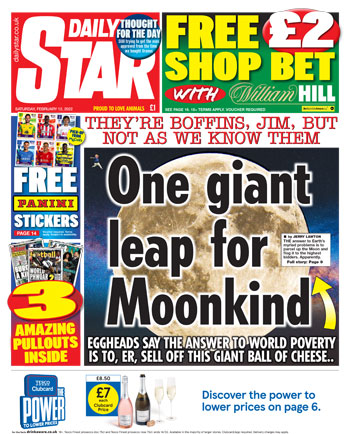
But while the “get out” alert seemed a gift from the splash gods – one that I’d probably have grabbed with both hands – I wasn’t so sure when I saw it there in black and white. Who, exactly, was this story aimed at? The reports told us that the number of Brits in Ukraine was in the “low thousands”.
They also told us that these people were mostly very settled and entrenched in the country with their extended families and had no desire to leave. Remember, they have been living under the Moscow cloud since the annexation of Crimea eight years ago. They were most unlikely to be buying the Mirror or the Times. So the story couldn’t logically be aimed at them. Families at home? Well, they’d be worried enough already and had most likely been urging relatives to come home long before the Foreign Office uttered. Maybe a few might pick up the phone and call to say “Look, see. Now you really have to do something.” But that’s a very niche readership for a splash; Wagatha Christie and buying a chunk of the Moon might well seem to have greater audience potential.

So, on reflection, the “get out” stories came down to (a) going for the obvious and (b) – once again – conveying the message the government wants out there, rather than making an independent thoughtful decision. The Government has a duty to give its nationals warnings on dangers they might face and it will have been smarting from the fallout from its slowness over the fall of Kabul. The official line was that people should take any commercial flight they could because there would be no state-organised airlift. In other words “You’re on your own if you don’t do as we suggest”. Except, the Times also reported that the 19 Airportable Brigade in Colchester is being readied to evacuate Brits if required.
I’m not saying these papers were wrong in choosing this as the main story and I’m certainly not saying they should not have reported the warning. But it felt like knee-jerk journalism that left the Telegraph standing proud on the newsstands. Its strong front page, angled on the apparent imminence of the threat, recognised the pre-eminence of Washington and Kyiv in all this – Biden’s warnings, a Ukrainian soldier for the picture. The warning to Brits was there, but there was an awareness – absent elsewhere, but present throughout the Telegraph’s coverage – that the UK is a supporting actor in this drama, not the star.
It felt like knee-jerk journalism that left the Telegraph standing proud on the newsstands.
Not our finest hour
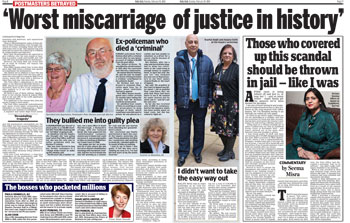
It has variously been described as the “biggest” or the “most widespread” miscarriage of justice in history. Hundreds of people wrongly convicted, jailed, bankrupted, even driven to their deaths because of a national institution’s refusal to countenance that its computers might not be infallible.
The Post Office scandal that is now the subject of a public inquiry takes your breath away. More than 700 people’s lives ruined, yet those in charge at the time have not only faced no penalty, but even risen in society. Paula Vennells, chief executive when those postmasters were being hounded, was made a CBE in 2019 “for services to the Post Office” and spent a year until 2020 as a non-executive director at the Cabinet Office – a seat right at the heart of government.
To recap, Fujitsu’s Horizon computer system was installed – in the face of Luddite objections from many postmasters – from the end of 1999. Over the following decade, a number of discrepancies in accounts came to light and postmasters were chased to repay money that had mysteriously disappeared.

In January 2007, the Yorkshire Post reported that Lee Castleton had gone as far as the High Court to argue that £25,000 apparently missing from his accounts was not missing at all, but the result of problems with the computer system. The Post Office had sued him for the money and Judge Richard Havery QC found in its favour, concluding that the Horizon system was working properly. The court adventure added £200,000 in costs to Mr Castleton’s bill, but this was a civil action, so at least he didn’t go to jail.
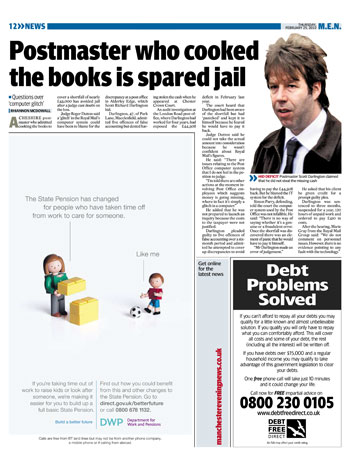
Three years later, another judge was less convinced about the soundness of Horizon, and imposed a suspended sentence on Scott Darlington, who had admitted five charges of false accounting over a £45,000 deficit. Judge Roger Dutton said: “There are issues relating to the Post Office computer system that I do not feel in the position to judge. I'm told there are other actions at the moment involving Post Office employees which suggests money is going missing, where in fact it's simply a glitch in a computer.”
“Other actions.” “A glitch.” This was back in 2010. The judge declined, however, to launch an inquiry because of the cost to the taxpayer. And the Manchester Evening News still deemed Mr Darlington culpable, headlining its report “Postmaster who cooked books is spared jail”.
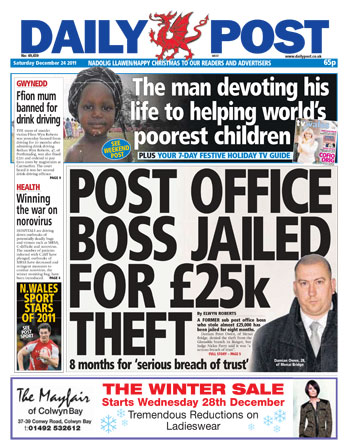
Damian Owen of Bangor was less fortunate. On Christmas Eve 2011, the Welsh Daily Post splashed on “Post Office boss jailed for £25k theft”. He was sentenced to eight months after a jury took less than an hour to convict him for what the judge described as a “serious breach of trust”. He was far from the first. Tracy Felstead was 19 when she was jailed in 2002, Noel Thomas was jailed in 2006, Janet Skinner in 2007, Harjinder Butoy in 2008, Rubbina Nani and Seema Misra in 2010.
It begins to sound like a horror film, where there are isolated incidents around the country and you find yourself screaming at the hero to join the dots and wake up to the fact that something bad is happening. But who would join the dots? These are little local paper stories. Big sums in personal lives, but small in the grand scheme of things. Hardly worthy of national attention.
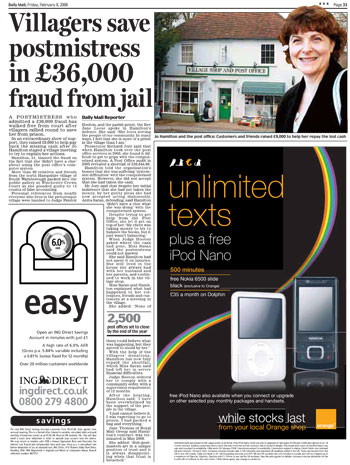
One case did catch the eye of the Mail. In February 2008, it reported “Villagers save postmistress in £36,000 fraud from jail”. Again, there was an acceptance that she was guilty – she admitted the offence. The interest was not in the case per se, but in the fact of a village rallying round a popular woman running a picture postcard post office, both to raise some of the “missing” cash and to offer character witness testimonies to be presented in court.
If you were to try to join dots on the evidence so far, it might be to conclude that too many computer illiterate people were running post offices in sleepy villages or that too many had their hands in the till. But there was more to it than that.
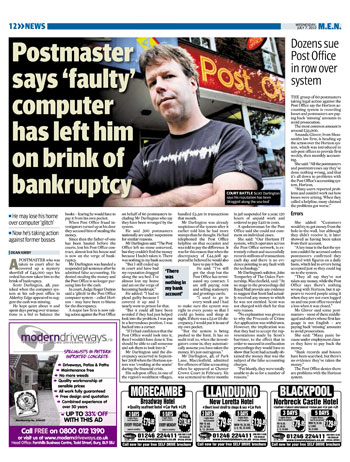
In July 2010, five months after his failed High Court case, the Manchester Evening News returned to Scott Darlington to report that he was not giving up his fight. And not only that, dozens more were joining him. Sixty were suing the Post Office and Mr Darlington claimed that 300 postmasters had been suspended over similar accounting discrepancies. Surely now someone in a national newsroom might think this worth a look?
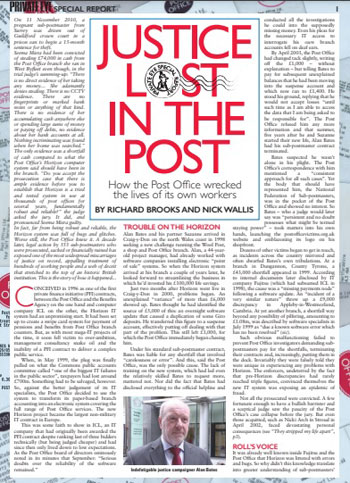
The journalist Nick Wallis, then a local radio presenter, had heard about Seema Misra’s story from her taxi driver husband and chased it up (and has stuck with it doggedly ever since, writing a book on the scandal); Computer Weekly had been aware of possible problems with Horizon for five years before it published the results of a six-month investigation in 2009; Private Eye was also on the case. But it was not until 2012 that any of the nationals showed any interest – and then largely because MPs were taking notice rather than as the result of any journalistic curiosity.

On June 22, the Telegraph carried a small single on page 4, headlined “Post workers win a review of theft cases”. Ten cases out of a hundred where legal action was being contemplated by postmasters were going to be examined by a forensic accountant, thanks to a meeting between the Post Office and MPs. The Post Office, however, “continued to have absolute confidence in the robustness and integrity” of its branch accounting processes.
So, we have a hundred postmasters with a grievance sufficiently credible for MPs to hold a meeting with the Post Office – Andrew Bridgen is quoted in the story as one of the complainants was a constituent – but still only one paper is interested.
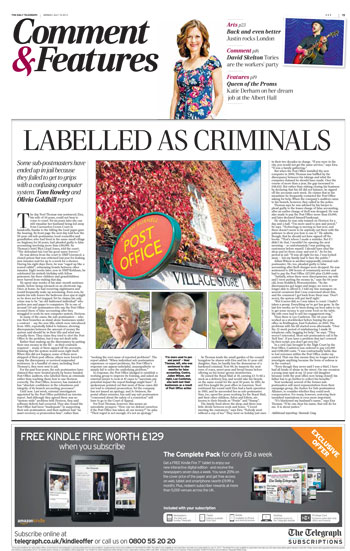
It took more than a year for the paper to return to the subject, with a full-page lead feature headlined “Labelled as criminals” on July 15, 2013 – a week after external investigators published an interim report admitting there were software defects and that the Post Office had been unsupportive and biased towards “asset recovery” or prosecution.
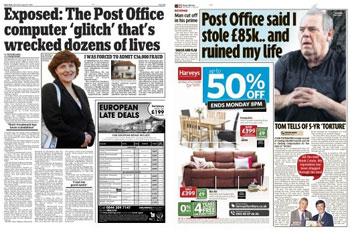
The Post Office then started abandoning prosecutions and agreed to review other cases. The Mail and Mirror woke up on August 17 – the Mirror telling the story of a man who had been almost bankrupted, the Mail proclaiming on page 29: “Exposed: the Post Office computer ‘glitch’ that’s wrecked dozens of lives”. Ah well, better late than never.
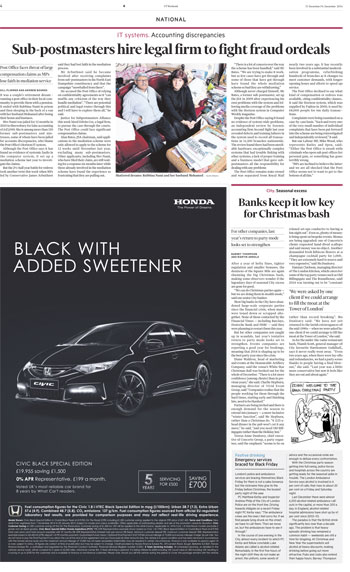
The FT joined the party in December 2014, with a story headlined “Sub-postmasters hire legal firm to fight fraud ordeals”. Once again, it was MPs who were leading the way, having “lost faith” in the Post Office’s mediation process. Mike Wood, then Labour MP for Batley and Spen, was quoted as saying: “Either the Post Office is awash with criminals who open sub post offices for personal gain, or something has gone terribly wrong. MPs are inclined to believe the latter and we are all shocked that the Post Office seems not to want to get to the bottom of all this.”
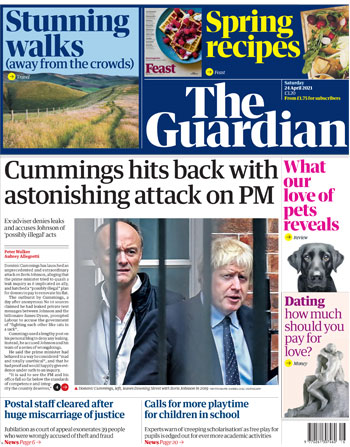
Exactly! Wasn’t this something that journalists should have been chasing for years? By 2015, nearly 3,500 postmasters had been accused of embezzling and 736 had been prosecuted. Yet coverage was not only sporadic; for most nationals, it was non-existent. Last spring, 39 people had their convictions overturned – undoubtedly a record in one hit – but the ruling made even the most modest appearance on only one front page: at the bottom of the Guardian. Everyone else was more interested in Dominic Cummings declaring war on Boris Johnson. And when it came to inside coverage, Covid, Ryan Giggs and more Cummings all conspired to push the story back in the book.
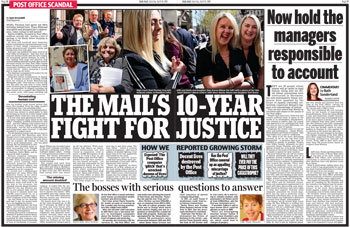
The Mail did give it two spreads; the second a piece of shameless self-promotion: “The Mail’s 10-year fight for justice” (this eight pages on from another spread headlined “Mail exposés that rocked No 10”). But it hadn’t been fighting for justice for ten years. Its first look at the story – as evidenced by the boasting ragouts – was that page 29 story eight years earlier. It did return to it with “special investigation” spreads three times after that, but there was still a blindness (or rather deafness) there. The second of those specials appeared after Nick Wallis made personal contact with new editor Geordie Greig. Greig told him that his local sub-postmaster had been “bending his ear relentlessly” about the story – but apparently not sufficiently relentlessly for him to do anything about it without further prompting. (Nick Wallis was interviewed by Ray Snoddy in the current issue of InPublishing magazine.)
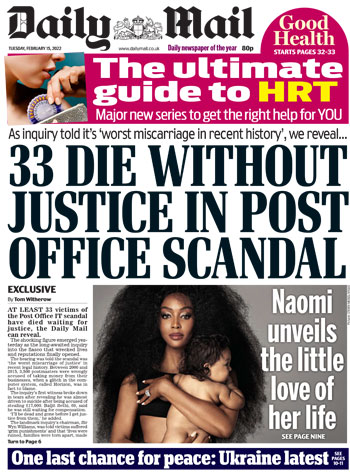
On Tuesday this week, the paper splashed on “33 die without justice in Post Office scandal”, with an inside spread on “Worst miscarriage of justice in history”, to mark the opening of the public inquiry. This was the first time this scandal had made a national newspaper lead story.

Even now, editors aren’t taking notice: the Mirror had to scramble its report of the first day’s evidence into page 27 of the second edition. That means somebody at some point really judged a Jane Austen letter coming up for auction a better story. Or the “worst miscarriage of justice in history” was completely off its radar. And when they did find space for it, they shoehorned it in without troubling to redesign the page, still believing that Tom Daley out rowing was more important or interesting.
The Sun, Metro and Star didn’t care either; the i put it on page 25. The Guardian, Times, Express and Telegraph all gave the hearing roughly the same treatment around pages 9, 10 or 11.
More telling of the same stories, you might think. Too many public inquiries, you might think. Maybe so. And anyway, it’s a bit late now. In truth, we have been drip-fed these case histories over the years. The Mail’s self-aggrandisement last year was misplaced, but it did sort of cotton on eventually and kept having another bite. As to the rest, even when the scandal was screaming at them, they just gawped and did nothing.
To reiterate: the Manchester Evening News first reported twelve years ago not only that a judge had said in open court that he thought the Horizon system might be faulty, but also that 60 postmasters were planning to sue. And even that was a decade after the first dodgy cases had emerged. Computer Weekly had published its special investigation a year earlier.
Whatever happened to monitoring the trade and regional press? (If you still need convincing of the need to do that, just look at Inside Housing’s coverage of cladding issues for years before Grenfell). Think of the lives that might not have been wrecked if only someone in Fleet Street had been reading these sorts of publications with an open brain and taken up the issue way back then. But instead it took MPs swapping constituency surgery anecdotes in the Commons tea room, calling meetings, demanding inquiries, before the nation’s supposed finest journalists accepted that there was something amiss.
This is yet another story that found its way into the papers courtesy of Westminster. There are other places where things happen. The Post Office is the real villain of the piece here. But it has certainly not been the national Press’s finest hour.
Whatever happened to monitoring the trade and regional press?
In football news…

Time to lighten up.
The Wagatha Christie saga has been a guilty pleasure from the word go. A serious student of print journalism might examine which side papers have been on – and, for obvious reasons, pay particular attention to the way the wind blows at the Sun. But after this week’s match, I think we should call in VAR to determine what the scoreline should be.
Football has always been a cash cow for the Sun. During last year’s Euros, it splashed on the tournament every day for a fortnight, but I can’t remember any other period when the game has given it such a diverse selection of lead stories in the space of two weeks. We’ve had seven so far this month, four of them seriously serious stories – two players arrested over alleged violence and two days of Kurt Zouma’s cat video. That was an agenda-setting story that struck a chord across society. Well played.

Then there was Jordan Pickford on Tuesday. Not quite in the same league as crime goes, but I really liked the page, especially the neat “Becky, Naomi, Natalie” puff panel down the right. No frills or gimmicks, just nice and clean. And a story count of five to boot. Excellent.

Digging up the past

Crime is, of course, a staple for the tabs. And none more so than the Mirror. If you had to detail its USP, you’d have to go with “Sick children, puppy farms and old lags”. There’s nothing the paper seems to like better than dredging up old crimes and criminals, many of whom its readers have probably never heard of. It was obsessed with Ian Brady and Myra Hindley. It wouldn’t let go of Jill Dando and won’t let go of Madeleine McCann. I was surprised it didn’t make more of the Levi Bellfield “confession” to the murders of Lin and Megan Russell this week.
A few years back, it splashed on the triple police killer Harry Roberts being allowed to take a driving test. The notion of a criminal, however awful, paying their debt to society and being rehabilitated once released is anathema to too many papers. But to be outraged about someone released on licence driving a car seemed a bit OTT.
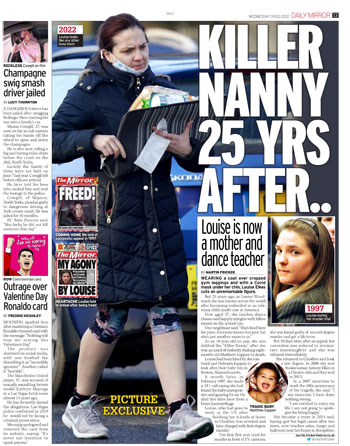
I was therefore, sadly, not surprised to see the paper make a page out of Louise Woodward daring to venture into the street. For those with short memories or too young to know, Ms W (she now has a new name) was convicted of shaking a baby to death in 1997 when she was a teenage au pair in America. She was sentenced to life for murder, but the conviction was swiftly reduced to involuntary manslaughter and she was freed after just under a year in custody.
The case has recently been revived by a Channel 4 documentary called “The Killer nanny: did she do it?” which appeared to shed no new light on the subject, offered no new evidence, and produced no changes of heart, merely raking over old entrenched arguments from both sides of the case.
This, it seems, was enough to pique the interest of the Mirror, which last Wednesday ran a near full-page photograph headlined “Killer nanny 25 yrs after”. Let’s ignore the abbreviation of “years”, which is the least of the sins of this effort.
Louise is now a mum and a dance teacher, we are told. Neighbours are aware of her past, but to them she is “just another mum”. She wears a coat, leggings, trainers and a mask. Er, and that’s it. Every other piece of information is regurgitated from the past. For readers who haven’t a clue why the picture is of any interest, the whole story of Matthew Eappen’s death, the trial, the appeal and her return to the UK are given a re-airing. The cuttings file and Wikipedia also help with her 2:2 law degree, her marriage, and quotes from a 2007 interview. Oh yes, and there are a couple of ragouts for good measure.
Why? Just why?
Police Chief gone; no thanks to the Mayor
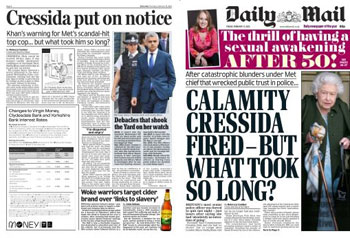
The Mail has been gunning for Cressida Dick for years. The “surely she MUST go now” headlines have been dusted off at least a dozen times in the past year alone. So there must have been a tricky five minutes in Derry Street when Sadiq Khan put the boot in last week. The Mail and the Mayor are not, let’s say, renowned fellow travellers. But, hey, my enemy’s enemy is my friend and all that. So we were given “Cressida put on notice” – but with a “what took him so long?” tag line.
When the commissioner resigned next day, hours after saying she was staying put, the paper’s joy was not quite unconfined. It was the splash, of course, but again with the same question attached – “what took so long?”
If you’ve been hammering at the door for ages and someone finally answers, I guess that’s a reasonable gripe.
What is, perhaps, less reasonable is to moan about the mayor’s previous inaction when your otherwise heroes the Home Secretary and Prime Minister not only made the appointment in the first place, but stood by the beleaguered commissioner through thick and thin, to the point of extending her contract.
Neat wordplay

Some nice headline writing on display this past couple of weeks. Still on the Met commissioner, may I commend this from Metro.
Puns can be wearying when they’re laboured and ubiquitous. It seems to be the law at the Sun for every other headline to be a pun and some are so tortured as to need putting out of their misery. But when words are your tools, neat wordplay is a joy. I liked “Thin blue line-up” as the Times looked at the paucity of candidates to replace Ms Dick, and “Lord of the blings” in the same issue on director Peter Jackson heading an entertainment rich list.
But the pearl for me in that paper was not a headline, but a jumbo cryptic crossword clue: “Philosopher and some things to mark his birthday? (9)”*
Front page of the fortnight

Prince Andrew’s settlement with Virginia Giuffre brought out the poster designers in force. The Express has been on a bit of a roll when it opts for a one-subject front and the Star definitely had the best headline. But for a page that packed in a heck of a lot and still had huge impact, in my view, the Sun came up trumps.

*Descartes.
Liz Gerard’s Notebook is a fortnightly column published in the InPubWeekly newsletter. To be added to the mailing list, enter your email address here.












